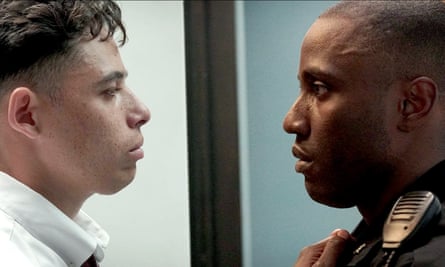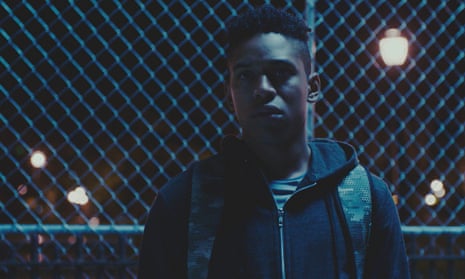Rage, fear and a wrenching sadness hang over this tough picture by first-timer Reinaldo Marcus Green. It’s a drama inspired by, among other cases, that of Eric Garner, the black man in New York who in 2014 resisted arrest for selling single cigarettes for loose change on a street corner, and died in a police officer’s chokehold as an onlooker filmed the event on his phone.
Green imagines a triptych of young African-American men, all affected in various ways by an incident like this and all caught in a fundamental crisis of loyalty – a loyalty to their community and opposing loyalty to their own terrifyingly precarious futures, in which they had hoped to keep their heads down and make their way in this compromised world. These are the futures desperately wished for them by their careworn parents’ generation, futures that could so easily be capsized by the tiniest bit of boat-rocking.
John David Washington (from Spike Lee’s BlacKkKlansman) plays New York detective Dennis Williams, who is up for promotion. Anthony Ramos (who played Lady Gaga’s best friend in A Star Is Born) is Manny, a nice guy from the neighbourhood with a partner and baby, involved in a little wrongdoing but on the verge of turning things around by getting a job as a security guard. Kelvin Harrison Jr is Zyrick, or Zee, a hardworking high-school kid with a wonderful talent for baseball that could be his ticket to glory. But the talent scouts don’t want to hear about trouble with the police.

Green allows us to grasp the irony that in wanting a security guard’s job, Manny is auditioning to be a kind of police officer. He has to wear a suit and sit behind the front desk in the building’s lobby. He has to learn the police officer’s technique of asking people who they are, what they want, and gauge their behaviour. Most importantly and ironically, he has to master surveillance. Visitors to the building have to look into a camera to have their face recorded.
So perhaps it is no surprise that when he sees a friend of his being harassed by police on a Brooklyn street corner, he takes out his phone and films something very incriminating, and then is confronted by the reality of police officers who are quite willing to frame Manny in revenge.
As for Zee, he is stopped and searched by cops who are, interestingly, mollified by the information that he is on his way back from baseball practice – not basketball, a sport that the police clearly associate with anti-authority and black defiance. Again, Green creates a nauseous irony: the cops didn’t find a certain something that Zee actually had on him. In all their racism and arrogance, it looks as if they have scared Zee straight. But he can’t forgive them. When he reached into his pocket, jittery cops asked what he was doing. But the information that it’s just a cellphone he’s getting out did not calm them. The point is that smartphones with cameras are as threatening as guns.
Dennis is a cop who must frequently suffer the humiliation of being pulled over in his car by other white officers when he’s off duty. The film conveys his swallowed disgust, as the loud music Dennis had been cheerfully playing has had to be snapped off as he waits for the officer to approach, to be replaced by the eerie heartbeat of his dashboard’s ticking. And the officers are not immediately appeased by Dennis producing his own badge: they have to check if one has been stolen. Yet, despite his fury at the racism inside his profession, Dennis is blindsided by emotion when two of his fellow officers are killed on the job, and he is moved by the impromptu prayer in the station house followed by the big public funeral. Doesn’t he owe the police his trust? Isn’t this the larger issue?
The strange resonances and contradictions echo back and forth between these three characters, one of whom is disturbingly withdrawn from the action, never to return. We simply never find out his ending. As well as all this, Green is able to tilt the tone of his movie towards humour and gentleness.
I laughed when Dennis hosts a dinner party and one of his guests reveals that they have a new cat, Simba, named after The Lion King. Instantly, Dennis raises his glass and proposes a toast: “All that the light touches!” And for a moment, everyone’s adult sadnesses vanish, replaced by happy memories of childhood. There is humanity and complexity in this welcome movie, as well as muscular power and unreconciled anger.

Comments (…)
Sign in or create your Guardian account to join the discussion